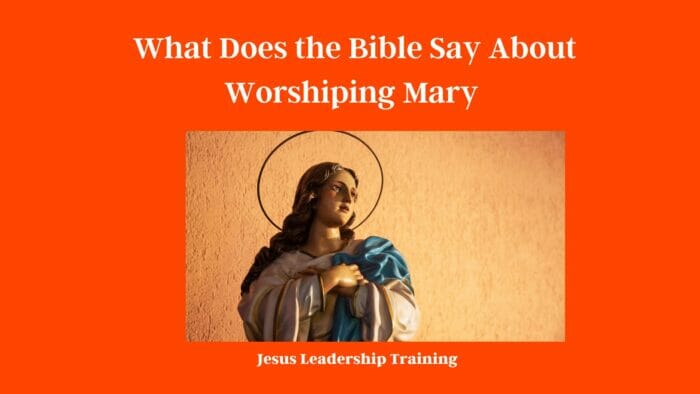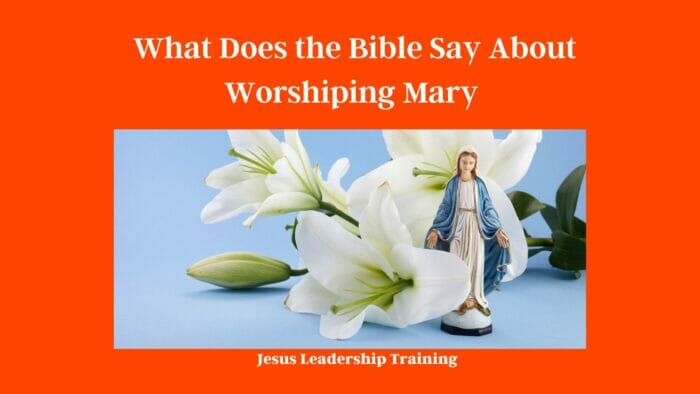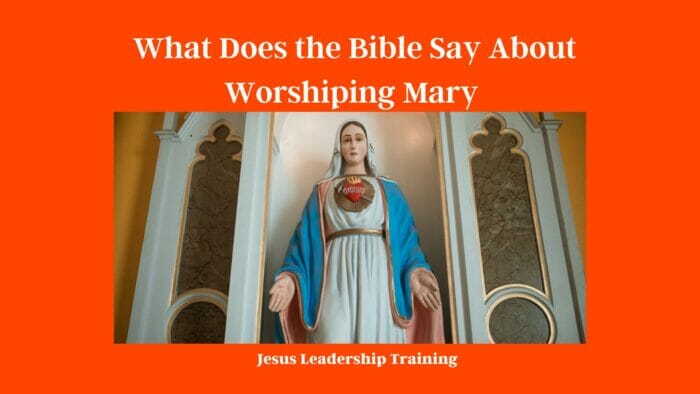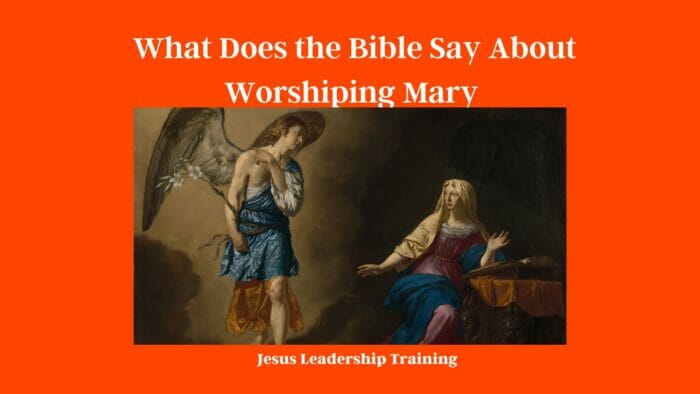What Does the Bible Say About Worshiping Mary – Worship is a topic of fervent debate within various religious communities, particularly regarding Mary, the mother of Jesus. To understand the biblical stance on this, it’s essential to delve into scriptures and traditions.
Table of Contents
What Does the Bible Say About Worshiping Mary
The Bible does not provide any direct teachings or commands about worshiping Mary, the mother of Jesus. While Mary is highly revered for her role as the mother of Jesus and is a central figure in Christianity, especially within the Catholic tradition, worship in Christianity is reserved for God alone, according to the Bible. The Ten Commandments explicitly state, “You shall have no other gods before me” (Exodus 20:3, NIV), emphasizing the worship of God alone.
Catholic and Orthodox Christians do venerate Mary, which is a practice of honoring her, and they consider her as the “Mother of God” and the greatest of all saints. However, veneration is distinct from worship, which is due to God alone. The reverence for Mary is seen by adherents as a way of honoring her willingness to accept God’s will and her role in the incarnation of Jesus Christ.
Protestant Christians typically do not venerate saints and focus on direct worship and relationship with God through Jesus Christ, adhering to the biblical principle of Jesus being the sole mediator between God and humans, as stated in 1 Timothy 2:5 (NIV): “For there is one God and one mediator between God and mankind, the man Christ Jesus.”
In all, while Mary is a revered figure in Christianity for her faith and obedience to God, the Bible does not instruct Christians to worship her, and the predominant Christian understanding emphasizes worship as being reserved for God alone.
What the Bible Teaches About Worshiping God
| Key Principle | Biblical Teaching | Scripture Reference |
|---|---|---|
| Spirit and Truth | Worship must be genuine and rooted in truth, not just external rituals. | John 4:23-24 |
| Sacrifice of Praise | Worship involves offering up praises to God as a sacrifice, recognizing His holiness and worthiness. | Hebrews 13:15 |
| Continuous Worship | Worship isn’t confined to specific times or places; believers should continually worship God in their hearts and actions. | 1 Thessalonians 5:16-18 |
| Gathering Together | Believers are encouraged to come together for communal worship, emphasizing the importance of the church body. | Hebrews 10:24-25 |
| Worship Through Obedience | True worship is reflected through obedience to God’s commandments, not just through songs or rituals. | 1 Samuel 15:22 |
| Holiness in Worship | Worshipers are called to approach God with clean hearts, seeking His righteousness. | Psalm 24:3-5 |
| The Role of Music | Music and singing are often used in the Bible as expressions of joy and reverence towards God. | Ephesians 5:19 |
| Thanksgiving and Remembrance | Worship often involves remembering God’s past deeds and being thankful for His blessings and salvation. | Psalm 100:4-5 |
| Humility in Approach | Worshipers should approach God with humility, recognizing their dependence on Him and His sovereignty. | James 4:6-10 |
| Personal and Corporate | Worship can be a deeply personal act between an individual and God, but it also has a crucial corporate component within the church. | Psalm 63:1, Colossians 3:16 |

What the Bible Says About Honoring Mary
Mary, undeniably, holds a place of reverence in the Bible. Her role as the mother of Jesus grants her an esteemed position within Christian traditions.
How Many Times is the Virgin Mary Mentioned in the Bible? While Mary’s appearances in the New Testament are selective, her importance is evident. She is predominantly mentioned in the Gospels, being directly referred to approximately 20 times.

What Does the Bible Say About Mary’s Death? The Bible does not specifically address Mary’s passing. Traditions and apocryphal texts fill in this gap, but they aren’t part of the canonical scriptures.
Does it Say Anywhere in the Bible that Mary is Without Sin? The concept of Mary’s sinlessness, or Immaculate Conception, isn’t explicitly stated in the Bible but is a belief upheld by many in the Catholic faith.

Bible Verses About Mary’s Intercession
Intercession, or the act of intervening on behalf of another, is a nuanced subject when related to Mary.
Why Do Catholics Ask Mary to Intercede? Catholics believe that Mary, being close to Jesus, can intercede for them, just as they might ask a friend to pray on their behalf.
Where in the Bible Does It Say to Ask Mary to Pray for Us? The Bible does not directly instruct believers to ask Mary for her prayers. However, the tradition is rooted in the idea that saints can intercede for the living.

What is the Intercession Prayer for the Virgin Mary? This prayer, often known as the “Hail Mary,” seeks Mary’s intercession. It’s a staple in Catholic devotions.
Why We Should Not Worship Mary
While Mary is revered, the Bible emphasizes worship should be directed to God alone.
One Mediator 1 Timothy 2:5 states that there’s one mediator between God and humanity: Jesus Christ.
Worship Only God The Ten Commandments caution against idol worship, emphasizing God’s uniqueness.
Mary Praying to God – Upper Room In Acts 1:14, Mary is seen praying to God, indicating even she sought divine connection.
Mary Needed a Savior Luke 1:47 has Mary referring to God as her Savior, underscoring her human nature.

Pros and Cons of Worshiping Mary: Catholic View vs. Bible View
| Criteria | Catholic View | Bible View |
|---|---|---|
| Pros | ||
| Veneration | Catholics believe in venerating (honoring) Mary, not worshiping her, due to her role as the Mother of God (Theotokos). | The Bible honors Mary as the mother of Jesus and as a woman of faith, but does not explicitly prescribe her veneration. |
| Intercession | Catholics believe Mary can intercede for believers, offering prayers on their behalf to Jesus. | The Bible emphasizes Christ as the sole mediator between God and man (1 Timothy 2:5), without mention of Mary’s intercessory role. |
| Traditions and Dogmas | Catholic tradition includes specific dogmas about Mary, such as her Immaculate Conception and Assumption into heaven. | The Bible does not explicitly mention these dogmas. Most of the doctrines surrounding Mary in Catholicism are derived from Sacred Tradition, not directly from Scripture. |
| Cons | ||
| Idolatry Concerns | Critics argue that the veneration of Mary can border on idolatry, detracting from the worship due to God alone. | The Bible warns against idolatry (Exodus 20:3-5) and emphasizes worshiping God alone. |
| Role Emphasis | Some feel Catholicism places excessive emphasis on Mary’s role, possibly overshadowing the centrality of Christ. | The New Testament places primary focus on the life, teachings, death, and resurrection of Jesus Christ. |
| Potential for Misunderstanding | The distinction between veneration (dulia) and worship (latria) can be confusing and might be misunderstood. | The Bible primarily emphasizes worshiping God without delineating different categories or levels of veneration. |
Mary Worship’s Pagan Origin
There are arguments suggesting Marian worship has pagan ties.
Catholic Pagan Syncretism Some argue that early Catholics incorporated pagan elements to make the religion more palatable.
Mary is Ishtar & Isis and Mary in Early Icons Connections have been drawn between Mary and ancient goddesses like Ishtar and Isis, especially in iconography.
Similarities Between Isis and Mary Both figures are seen as mother figures, leading to comparisons in roles and reverence.
Is It a Sin to Worship Mary?
Direct worship of anyone other than God is considered idolatry in biblical terms.
Idolatry & Blasphemy Misdirected worship can be deemed idolatrous and blasphemous, leading one away from God’s intent.
Pagan Similarities Drawing parallels with pagan deities may lead to questioning the nature of certain devotions.
Is It a Sin to Worship Mary? Catholic vs. Protestant Views
| Criteria | Catholic Views | Protestant Views |
|---|---|---|
| Definition of Worship | Catholics distinguish between latria (worship due to God alone) and dulia (veneration given to saints). Hyperdulia (a higher form of veneration) is reserved specifically for Mary. | Most Protestants do not have this distinction and believe worship should be directed to God alone. |
| Position of Mary | Catholics believe Mary has a special place due to her role as the Mother of God (Theotokos). They venerate her, but do not worship her in the same way they worship God. | Protestants respect and honor Mary as the mother of Jesus but generally do not assign her a unique role of veneration beyond other biblical figures. |
| Intercession | Catholics believe in asking Mary to intercede on their behalf, believing that her prayers are powerful due to her closeness to Jesus. | Many Protestants believe in praying directly to God, relying on Jesus as the sole mediator between God and man (based on 1 Timothy 2:5). |
| Basis for Belief | Catholic doctrines regarding Mary are based on both the Bible and Sacred Tradition. Sacred Tradition plays a significant role in shaping Marian beliefs. | Protestant beliefs typically prioritize the Bible as the primary source of doctrine (“sola scriptura”). Many Protestants believe Marian doctrines lack clear biblical support. |
| Concern of Idolatry | The official teaching of the Catholic Church is that Mary should be venerated, not worshiped. However, some critics argue that certain practices can blur these lines. | Many Protestants express concerns that Marian veneration can border on, or become, idolatry, detracting from the worship due to God alone. |
| Additional Marian Doctrines | Catholics uphold doctrines such as the Immaculate Conception and Assumption of Mary which elevate her status. | Most Protestant denominations do not accept these additional doctrines, viewing them as lacking biblical support. |
8 Types of Worship Practiced Today
Various religious and denominational traditions have diverse teachings on worship. Here’s an overview of some of the teachings on worship across major religious and Christian denominational traditions today:
1. Christianity
- Roman Catholicism: Emphasizes the Eucharist as the center of worship. Liturgical worship follows a structured pattern that includes scripture readings, prayers, hymns, and the Mass. Veneration of saints, especially Mary, is also a significant part of Catholic worship.
- Eastern Orthodoxy: Liturgical worship is central, with a focus on the Eucharist and the Divine Liturgy. The use of icons in worship is also distinctive.
- Protestantism:
- Mainline (e.g., Lutheran, Anglican): Worship tends to be liturgical but varies by denomination. The Eucharist or Lord’s Supper is often central.
- Evangelical (e.g., Baptist, Pentecostal): Worship tends to emphasize personal conversion and the authority of the Bible. Praise and worship music, sermons, and altar calls are common.
- Reformed/Presbyterian: Worship emphasizes God’s sovereignty. The preaching of the Word and sacraments (Lord’s Supper and Baptism) are central.
2. Islam
Worship, or Salah, is one of the Five Pillars of Islam. Muslims are required to pray five times a day facing Mecca. These prayers involve specific physical postures and recitations.
3. Judaism
Worship revolves around the synagogue and the home. The Shabbat (Sabbath) and Jewish holidays involve communal and family prayers, scripture readings, and rituals.
4. Hinduism
Worship or Puja varies widely and can be both communal and individual. Worship often involves offering food, flowers, and incense to a deity, reciting mantras, and performing rituals.
5. Buddhism
Worship might involve meditation, chanting, and making offerings to a Buddha image or stupa. There’s a focus on personal enlightenment and the Eightfold Path.
6. Sikhism
Worship takes place at the Gurdwara. Sikhs listen and sing hymns from the Guru Granth Sahib, their holy scripture. The community meal, or Langar, is an essential part of their worship and community service.
7. Baha’i
Worship involves daily prayers, reading scriptures, and gathering for the Nineteen Day Feast. The Baha’i House of Worship is open to all religions as a unifying space.
8. New Age & Alternative
Worship practices vary widely and might include meditation, chanting, energy work, and ceremonies based on various spiritual traditions.
FAQs: What Does the Bible Say about Worshiping Mary?
- Is Mary considered a deity in the Bible?
- No, the Bible does not present Mary as a deity. She is honored as the mother of Jesus, but there is no biblical mandate to worship her as a god.
- Does the Bible specifically mention the worship of Mary?
- The Bible does not provide any passages that directly advocate for the worship of Mary. Worship in the Bible is consistently directed towards God.
- What does the Bible say about Mary’s sinlessness?
- The Bible does not explicitly state that Mary was without sin. The doctrine of the Immaculate Conception, which suggests Mary’s sinlessness, is a teaching of the Catholic Church and not directly taken from scripture.
- Are there biblical verses where Mary is prayed to or venerated?
- While Mary is held in high regard, particularly in the Gospels, there are no verses where she is prayed to or receives worship.
- Does the Bible differentiate between veneration and worship?
- The Bible consistently directs worship toward God. While respect and honor can be shown to individuals, worship is a unique act reserved for God.
- What role does Mary play in the New Testament?
- Mary is prominently featured in the Gospels, particularly in the accounts of Jesus’ birth, early life, and at the crucifixion. She is revered as the mother of Jesus.
- Are there any biblical passages where Mary intercedes or acts as a mediator?
- The Bible does not depict Mary as a mediator in the same way Jesus is described in 1 Timothy 2:5. However, the Wedding at Cana in John 2:1-12 shows Mary bringing a concern to Jesus, though it doesn’t depict her as an intercessor in the spiritual sense.
- How does the Bible view idolatry?
- The Bible is clear in its stance against idolatry. The Ten Commandments, particularly the first two, emphasize that God alone should be worshiped and that idolatry is forbidden.
- Is the veneration of saints, including Mary, biblical?
- The New Testament acknowledges saints but does not provide directives for their veneration. The practice of venerating saints, including Mary, has historical roots in church tradition rather than explicit biblical mandates.
- What does the Bible say about Mary’s role in the end times or her heavenly status?
- The Bible does not provide specific details about Mary’s role in the end times or her status in heaven. Most references to Mary are in the context of her earthly life and her role as Jesus’ mother.
Final Thoughts
While Mary’s reverence is widespread, it’s vital to discern between veneration and worship. The Bible, being the cornerstone of Christianity, offers insights and guidelines on this delicate matter.
New Testament Commentaries
Below is a table featuring some renowned New Testament commentaries, their publishers, and websites where they can be found. Please note that availability may vary and it’s always beneficial to check multiple sources for acquiring these commentaries.
| Commentary Name | Publisher | Website |
|---|---|---|
| The New International Commentary on the New Testament | Eerdmans | Eerdmans |
| Word Biblical Commentary | Zondervan | Zondervan |
| Baker Exegetical Commentary on the New Testament | Baker Academic | Baker Academic |
| The New Testament for Everyone | Westminster John Knox Press | Westminster John Knox Press |
| Tyndale New Testament Commentaries | InterVarsity Press | InterVarsity Press |
| Expositor’s Bible Commentary | Zondervan | Zondervan |
| The Anchor Yale Bible Commentary | Yale University Press | Yale University Press |





